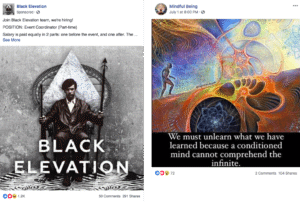Podcast: Play in new window | Download (Duration: 23:55 — 27.4MB) | Embed
In this episode of The Security Ledger Podcast (#106): with the November midterm elections in the U.S. fast approaching, election related shenanigans have already cropped up in connection with contested races in swing states, as well as around “hot button” issues such as gun control and race. To find out what the trolls are trolling about, we speak with Jonathan Morgan, the CEO at the firm NewKnowledge, which provides disinformation defense services for organizations.
As July passes into August, the political season is kicking into high gear ahead of the November mid term elections. And, right on schedule, the warning signs are flashing about malign influence operations that are trying to use platforms like Facebook and Twitter to provoke partisan anger and sow division within the voting public. The latest warning flare came from Facebook, which on Tuesday said that it removed the first of eight Pages and 17 profiles on Facebook for violating the site’s rules against “coordinated inauthentic behavior.” Despite the popular conception of election trolls ginning up right wing outrage, the groups Facebook found were often promoting left leaning causes including so-called “resistance” groups opposed to the administration of President Donald Trump.

But our guest on this week’s podcast says that nobody should be surprised to find that the people and governments backing online influence and disinformation campaigns flexible have a flexible attitude towards political messaging is a hallmark of minority issues. To paraphrase political consultant James Carville: “It’s the anger and division, stupid!”
Jonathan Morgan is the CEO of the firm NewKnowledge, which offers disinformation defense services for organizations of all stripes. In this exclusive interview with The Security Ledger podcast, Morgan talks about what his company has observed in recent months and how the face of online trolling operations changed in the wake of the 2016 Presidential race and what can we expect from online actors this campaign season? To find out we sat down with Jonathan Morgan, the CEO of the firm NewKnowledge, which offers online disinformation defense services for organizations.

[Spotlight Podcast: Why North Korean Summit won’t End Hacking Threat]
In our conversations, Jon and I talk about why online disinformation campaigns like those seen during recent elections are different from the kinds of influence campaigns that have come before, and how organizations facing online disinformation campaign can take steps to counter their damaging affects.
Jon said NewKnowledge is seeing “a steady stream of campaigns” that are trying to co-opt the national conversation around the mid terms using socially divisive issues. “We’ve seen everything from the way the NFL is interacting with players who are protesting police brutality…to gun reform and gun legislation…to topics around immigration,” Morgan said. “The typical divisive topics of conversation that end up being hot button issues in political campaigns? We’re seeing campaigns targeting these issues day in and day out.” Race figures prominently among those issues, with ads and groups targeting the Black Lives Matter movement prominent both in 2016 and during the 2018 midterms.
[RSA Labs: cloud, microservices, mobility shift terrain for security providers]
As fascinating as the rise of online disinformation campaigns is, there is danger in spending too much time focused on the actor or actors behind the campaigns -whether that is Russia or China or a terrorist group like ISIS. “Instead, we should be talking about (the) structural vulnerabilities they are exploiting that have allowed them to have such success in disseminating their narrative,” he told me. In other words: its not about Russia, but about how technology has allowed our public discourse to become vulnerable to manipulation in new and dangerous ways.
Check out my full conversation with Jonathan Morgan using the link above. You can also listen to our podcast over at Soundcloud. Click this link to listen to it there!

